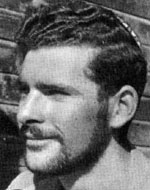Levin, Boaz
Son of Shlomo and Dina. He was born on 26.4.1949 in Kibbutz Tirat Zvi. He was two months old when his parents left and moved to Beit She’an. Afterward they lived in Kerem son of Zimra and moved to the village of Meron, where Boaz spent his years growing up and educating him. He was very attached to his family and his parents’ farm; He dedicated all his free time to work at home, in the yard, and in the farm. He studied at the local elementary school and was an outstanding student. He did not say much about it, if he was withdrawn and every word of his was deliberate. He played down the talk and the demands, but on the other hand, he did a lot of things. In the agricultural high school he studied at Kibbutz Yavneh and later graduated from the school. In August 1967 he was conscripted into the IDF, but he was still in compulsory service on April 20, 1969. He was laid to rest in the cemetery in Moshav Meron. A member of the service, from the days of the period after basic training, wrote to his parents that Boaz had a combination of different qualities. His friends knew him to “manage” with friends. He was the commander of the most wanted crew, not because others were worse than him, but because he was not far from his crew. Thus, every exit with him became a field of experience that symbolized the relationship between the commander and his people. He wrote that Boaz was the only religious among the Jewish people and was meticulous in his observance of the commandments. There were many disagreements between us in matters of mitzvot and religion, laws and customs; And Boaz could always explain and clarify and always reached the point of faith. Boaz was able to explain things logically, in a warm and clear analysis, with persuasive explanations – and in several words, with that modest smile hovering over the corners of his mouth, a look of such characteristic innocence on his face. Boaz stood out in his quiet and unrelenting stability. He was withdrawn-not distant or detached, but self-contained, and seldom spoke of the period of his studies in Yavneh, which he described as the most Yaffa period of his life. He also talked about the work, the friends and his house, and especially about Meron and her quiet atmosphere. Boaz had a clear and reserved approach to all those accepted forms of discovery. He did not understand the enthusiasm for all the usual songs and even the modern dances, perhaps because he was alien to him or perhaps because he did not care. All this worship of idolatry and all that is involved is not only alien to him but despised. Boaz “taught” his friends that the work, stay in the family and the same unrestless silence were loved by him most and did not need all those forms of disclosure accepted by the youth
